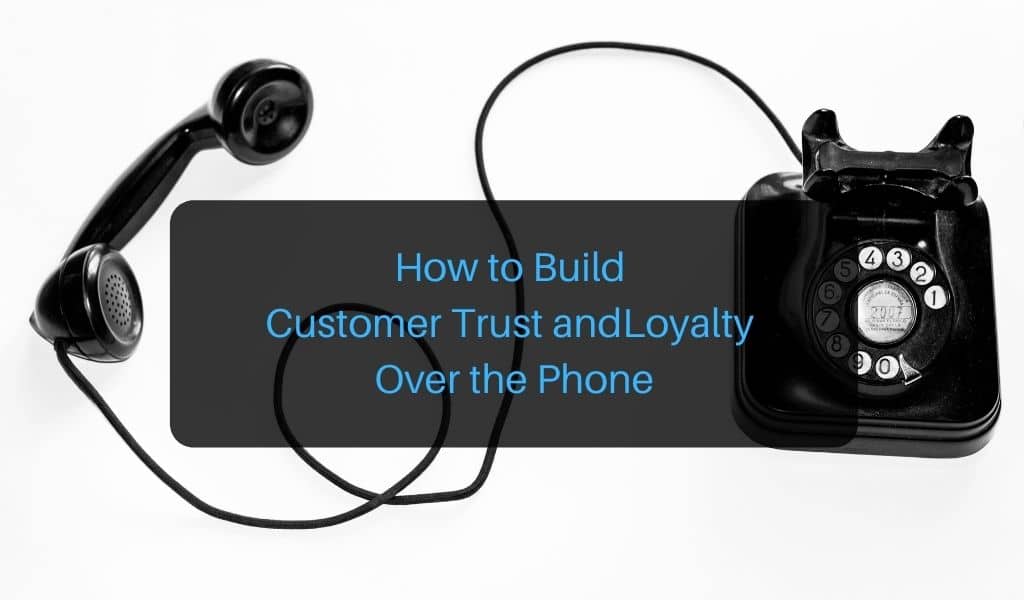Developing relationships over the phone presents some challenges, but they’re definitely surmountable. Here are some tips on how to build customer trust and loyalty even when you can’t be face-to-face.
There’s a lot of training and development that goes into becoming a successful salesperson, especially if you’re selling over the phone. Still, many telesales professionals are never really taught how to build customer trust and loyalty through what are often short and infrequent calls.
While in-person sales reps have the luxury of taking clients out for lunch or otherwise interacting with them face-to-face for at least thirty minutes at a time, phone sales reps have to rely on different skills to forge those connections that will turn into closed deals.
Fortunately, learning how to build customer trust and loyalty over the phone isn’t as difficult or overwhelming as it may sound. With a few quick pointers, you’ll be on your way to chatting people up and winning their business without ever meeting them in person. Just remember that even with these tips, you’ll have to practice to find your sweet spot, so don’t get discouraged if things don’t turn around for you right away!
Use Call Logic to streamline your phone sales process, maintain customer profiles, send follow-ups, and much more. Sign up for a free demo today to see all we have to offer you!
How to build customer trust and loyalty in 9 steps
1. Demonstrate expertise
You’ll have a hard time figuring out how to build customer trust and loyalty if you don’t become an expert on your offering pretty quickly. Few things put up a customer’s defenses like a telesales rep who sounds like they’re not entirely sure what they’re talking about. That’s not to say you’ll always know everything about an offering, but the number of times you have to tell a customer you’ll look into an answer to a question they’ve asked should be minimal.
2. Honesty is still the best policy
On a similar note, if you don’t know the answer to something, it’s better to admit it and find an answer than to make up answers. Even more broadly speaking, you don’t want to be the salesperson who tells outright lies to a customer in order to garner interest. This strategy almost never works, and if it does once with one customer, it probably won’t again. Customers frequently can tell when a salesperson isn’t honest, which will hurt your reputation much more than falling short of making a sale.
3. Be empathetic
If we had to sum it up, showing empathy is the ultimate path in learning how to build customer trust and loyalty in any setting. When a customer tells you about an issue they need solved or if they make objections to your pitch, always say things like, “I understand why you’d feel that way,” or “I completely get what it is you need.” Everyone wants to feel understood in all circumstances, but if a potential customer gets the sense that you can’t relate to them at all, it’ll be tough to gain their confidence enough that they’ll give you their money.
4. Use their name
This seems like a small thing in the grand scheme of how to build customer trust and loyalty over the phone, but it goes a lot further than you’d think. Using someone’s name makes the conversation more personal and less transactional, not to mention that it helps a person to feel a certain familiarity even if they’ve only just spoken to you for the first time. Pro tip, though: Make sure you know how to pronounce their name before you use it!
5. Listen actively
Active listening is a skill that’s critical for the success of any phone salesperson. Start by asking open-ended questions rather than yes/no questions, then really listen to what the customer has to say. Don’t let your mind wander to your pitch. Be patient and listen intently so you can best figure out how to solve their situation. Active listening can also lead to upsells and cross-sells, so keep that in mind as well!
6. Provide data, proof
Another great way to build trust and loyalty is to provide the customer with information that underscores the point you’re trying to make. Go in with statistics on success, customer testimonials, and other tools that can demonstrate you’re not trying to sell bridges to anyone. If you can tailor your statistics to each specific customer, that’s even better.
7. Find common ground
Customers will relate to you better if you can meet them on a familiar level. Perhaps you’re both into a particular sport, or maybe there’s an upcoming event that’s worth talking about. You could also share stories about kids in school, experiences in college—the list goes on. Get creative here and find common ground that interests your customer and gets them talking.
8. Mind your body language
True, you can’t see your customers over the phone, but did you know that your body language is reflected in your tone? Before each call, make sure you’re sitting up straight (or standing!), that you appear confident and ready to go (even if you’re working from home in your pajamas!), and that you maintain a bright smile on your face. These things will help you exude the charisma and energy that draws people to you and allows them to let their guards down and take a chance on trusting you.
9. Follow through
Whether it’s something as simple as a promise to follow up or something bigger, staying true to your word will go miles in developing customer trust and loyalty. If you have a lot on your plate and you’re worried about remembering, try using call management software like Call Logic to help remind you about promises you’ve made and tasks that need doing. Falling short of your commitment to a customer is another surefire way to lose their business, not to mention that failure to follow through is not something you want as part of your reputation out there in the world. If you say you’re going to do something, do it as quickly and accurately as possible. The faster you act, the faster customers will know you to be a person of your word, and the more likely they’ll become to buy.
It can take time to build customer loyalty and develop a strong relationship. By taking the right approach, you can ensure that you’re on the path to success.
Set reminders, schedule meetings, analyze call metrics, automate voicemails—the list of impressive features never ends! Check out a free demo of Call Logic today to see us in action!

